
I’ve tried not to think too much about Safari’s Intelligent Tracking Platform (ITP) lately. The topic tends to get me worked up and grumpy. For those of you who don’t know much about ITP, I’ll link to a few resources here as this post is not meant to be an introductory description of the issue.
https://www.seerinteractive.com/blog/what-is-intelligent-tracking-prevention/
https://digiday.com/marketing/what-is-itp2-2/
The following short post is a friendly musing of me pulling some of our own client’s data to see what sort of practical impact it would have to live in a totally ITP world. Also, I note that this is not a post for how to circumvent ITP. Currently, Adobe is by far leading the pack as far as vendor’s go in terms of implementing a quality solution. Simo Ahava also put together a server-side solution which seems attainable though not trivial to implement. At Analytics Ninja, we tend to work directly with the development teams of our client’s to handle the cookie management piece of work with localStorage for a quicker client side patch. One of my major gripes is that for the majority of companies that I work with, implementing a “solution” to deal with the Apple being totally heavy handed is costly and time consuming.
Methodology
I ran queries across 10 client sites collecting data from October 28th, 2019 until June 1st, 2019. To make the data analysis easier, I tried to choose sites where I had the “First Visit Date” stored as a Custom Dimension.
The GA Client ID includes a timestamp indicating the moment of _ga cookie creation. This can be converted into a YYYY-MM-DD using javascript and then stored as a string. I’ve found this dimension useful for cohort analysis, especially as Google does not expose first visit date in their API. It’s worth noting that First Visit Date parsed from the clientId is not identical to the First Visit Date in GA (server-side). Their was certainly some minor “noise” in my data that I had to clean up due to people’s browser time being set to the distant past or future.
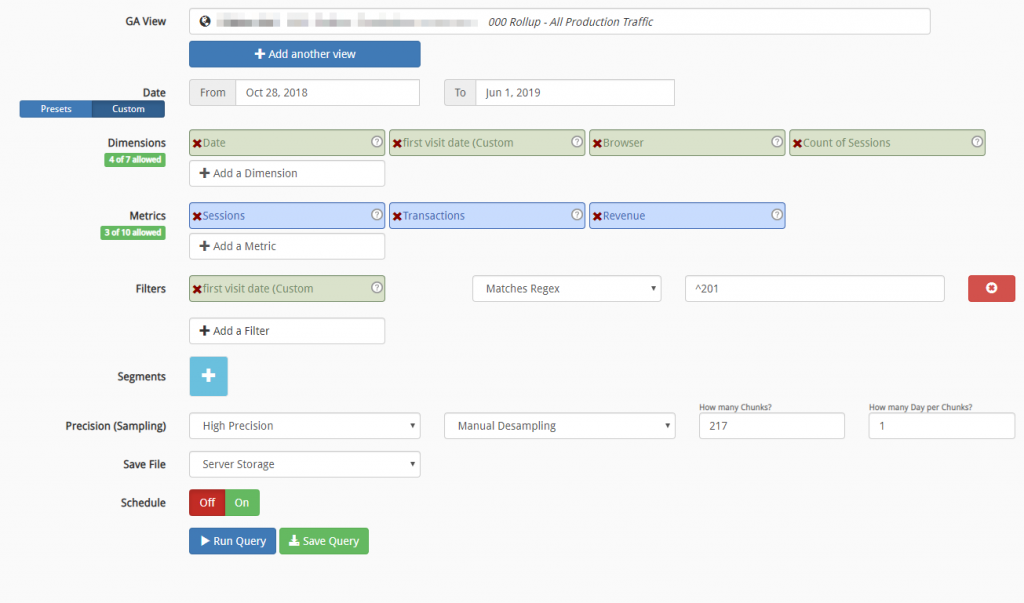
I focused on ITP 2.1’s seven day cookie-gaeddon as opposed to the ITP 2.2 cookie nuclear winter simply because it’s not clear to me yet if ITP 2.2 is going to wipe all cookies if the site has a visit with a gclid or fbclid or elqtrackid etc, or if Apple is just going to attack Google Ads, Facebook Ads, and Eloqua directly by deleted their cookies but sparing other first party cookies for an additional six days. For this ITP 2.1 analysis, I wanted to see what was the impact on tracking visitors who had a “first visit date” that was more than 7 days earlier than the current date. Ostensibly, if all browsers played by Webkit rules, those users become “new”, and attribution in GA is wiped clean.
I originally started my data exploration using Excel + PowerQuery. Even though my desktop computer is chock full of RAM, the millions of rows that made up the data set made Tableau seem like a better choice.
I did not, for the purposes of this post, break down the numbers by browser share. Site’s can have very different % browser share which differ significantly from global averages. As such, this means that “your mileage will vary.” I ran a theoretical “what would happen if ITP 2.1 was the norm tomorrow” exercise across all browsers.
The Data
The purpose of the first break down of the data was to look at each site, and visualize numerically the amount of sessions where the session that took place came before or after the 7 day cut off. The result showed the number of transactions attributed to sessions that would have occurred before or after the cut off (not all site’s had ecommerce), and the amount of revenue that would be classified as before or after the 7 cookie lifespan cut off.
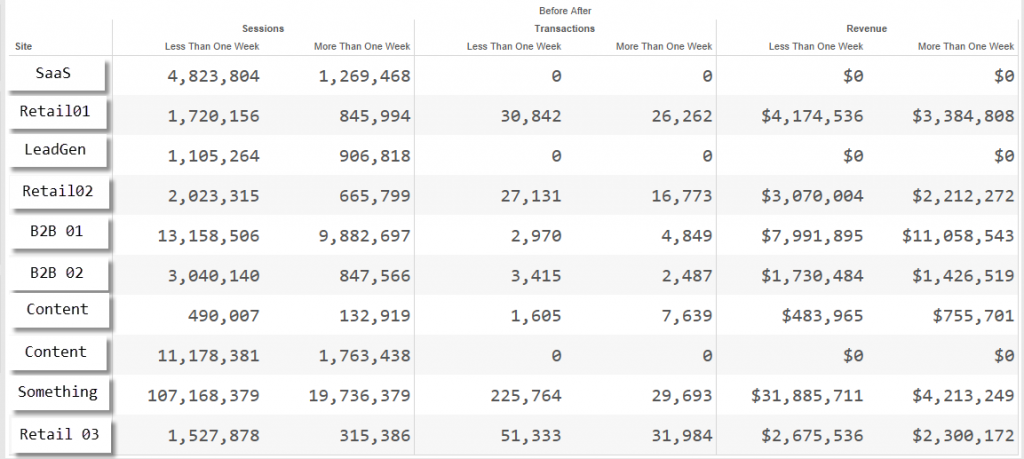
I then ran the a quick table calculation to turn those numbers into some percentages to provide a bit more context.
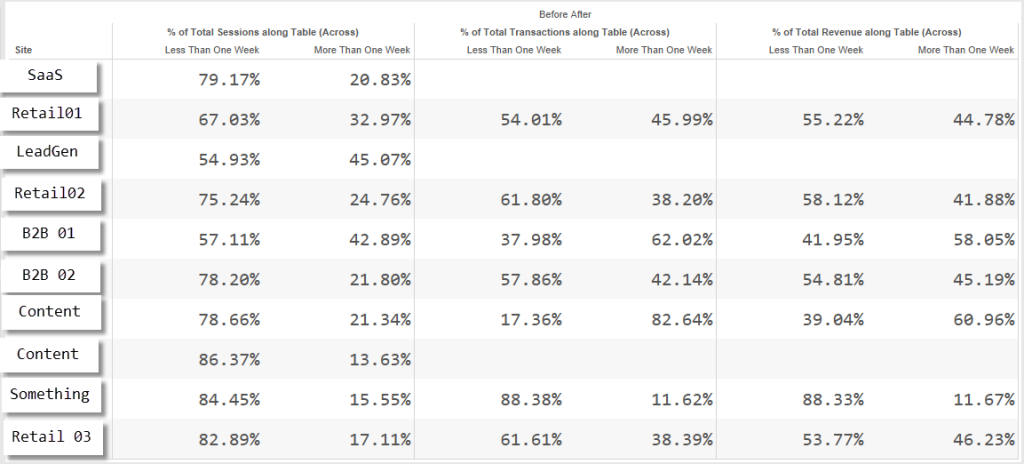
With regard to sessions, sites range between about 15 to 40% of sessions stemming from a user with a _ga cookie creation date more than 7 days from the date of their current session. Not surprisingly, but really nice to see quantified, was how many conversions (for sites with online revenue) would have been snipped by the ITP 2.1 cookie scissors.
Some highlights:
- Retailer #01 had about a third of their overall sessions with a cookie create more than 7 days from the date of the current session, while about 45% of their of their sales source from users with a 7+ day old cookie. $3.4M in revenue would be incorrectly attributed in GA during the 7 month period of the data set.
- Lead Gen site #01 had about 45% of sessions attributed to 7+ day old cookie.
- Retailer #02 had a greater percent of “new users” than Retailer #01. Their 25% of sessions with a 7+ day old cookie was responsible for 42% of revenue during the time period of the data set.
- B2B company #01 has a longer sales cycle that represents itself in the data. While 45% of the sessions to their site were attributed to a 7+ day old cookie, a full 58% of their online revenue came from those sessions. Over $11M in revenue would have be incorrectly attributed in GA if cookies were wiped after 7 days.
- The company I referred to as Something would be less impacted than the other companies by a 7 day cookie cap. About 15% of their sessions were attributed to a 7+ day old cookie. Still, that is almost 20M sessions in the date range which would have been negatively impacted by a cookie cap.
- Retailer #03 saw 17% of their overall sessions attributed to a 7+ day old cookie, with 38% of transactions and 46% of revenue attributed to those same cookies. The average order value for the 7+ day old cookie holders is 38% higher than their newer counterparts. About $2.3M of their revenue would have been incorrectly attributed in GA if cookies were capped to 7 days.
Here is the same data as above, visualized using bar charts (and removing the largest site as it was so much bigger in scale to the others it made it very difficult to the smaller sites).

So far, I have not seen much of an impact or general roll out of ITP 2.1 across the 10 sites I’ve analyzed. Clearly, that will change over time, though it is important to note that currently Safari does not have a huge browser share and Google is not about to take an axe to cookies in Chrome until the develop a method of completely demolishing all competition first.
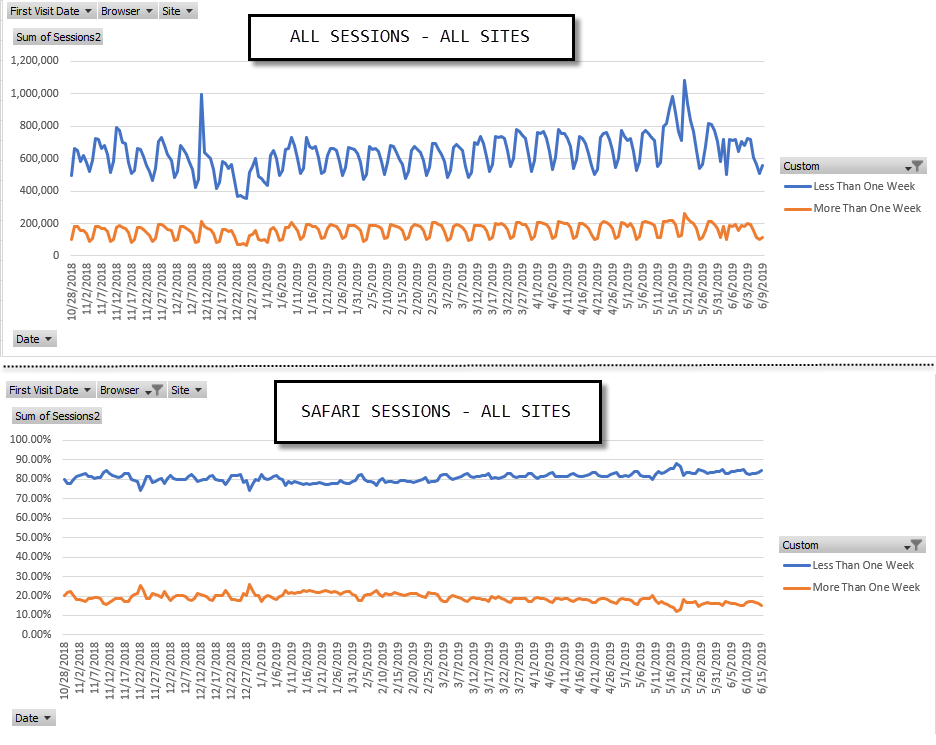
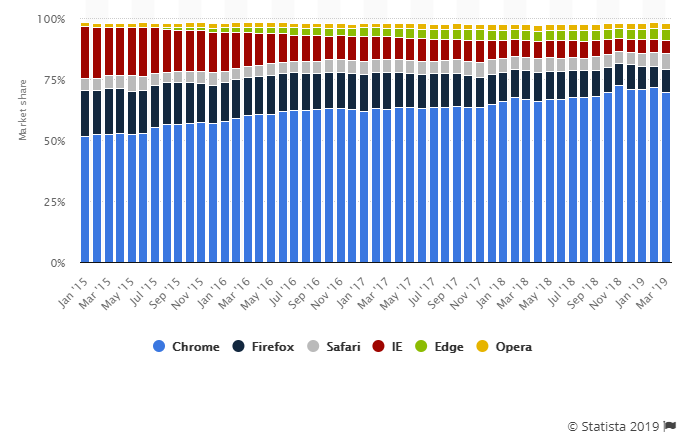
https://www.statista.com/statistics/544400/market-share-of-internet-browsers-desktop/
So, as a result of this exercise, I was able to confirm my belief that ITP 2.1 is a heavy handed, B.S. move by Apple in the name of “privacy” that will make a real difference to companies trying to measure user behavior and run A/B tests unless they invest in a solution which circumvents the Webkit logic in the browser.

Leave a Reply